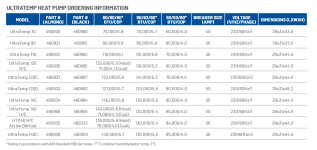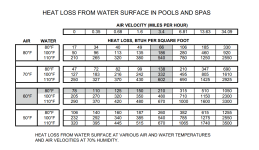Does anyone have a heat pump calculator that if I for instance put in the ambient temperature, starting water temp, desired temp, pump flow rate, how long it should take to heat up a pool of x gallons with a heat pump of x BTU? My heat pump has always been slow and there is no good calculator to find to see if I am having problems or if what I am experiencing is normal. Thanks.
Heating Time Calculator
- Thread starter goldmaes
- Start date
You are using an out of date browser. It may not display this or other websites correctly.
You should upgrade or use an alternative browser.
You should upgrade or use an alternative browser.
- May 3, 2014
- 62,753
- Pool Size
- 6000
- Surface
- Fiberglass
- Chlorine
- Salt Water Generator
- SWG Type
- Pentair Intellichlor IC-40
You have to calculate the heat gained and heat lost.
The heat gained depends on the heater size, pool volume, water temperature and the ambient conditions.
The heat lost Depends on the water temperature, surface area, ambient conditions and if the pool is covered or uncovered
As the water heats up, the equations change.
So, you have to do an iterative process.
For example, if you start at a water temperature of 60 degrees and you are heating to 86 degrees, you can break it into maybe 6 calculations.
Water temperature.....Gain/hr.....Loss/hr.....Net Gain or Loss..............Time
60...................................1................0.45.............0.55 degrees.................9.1 hours.
65
70
75
80
85
So, you can calculate the time to go from 60 to 65 and then 65 to 70 etc.
The losses will be from a combination of evaporation, conduction, convection and radiation, so the calculations are not simple or easy to do in an accurate way.


The heat gained depends on the heater size, pool volume, water temperature and the ambient conditions.
The heat lost Depends on the water temperature, surface area, ambient conditions and if the pool is covered or uncovered
As the water heats up, the equations change.
So, you have to do an iterative process.
For example, if you start at a water temperature of 60 degrees and you are heating to 86 degrees, you can break it into maybe 6 calculations.
Water temperature.....Gain/hr.....Loss/hr.....Net Gain or Loss..............Time
60...................................1................0.45.............0.55 degrees.................9.1 hours.
65
70
75
80
85
So, you can calculate the time to go from 60 to 65 and then 65 to 70 etc.
The losses will be from a combination of evaporation, conduction, convection and radiation, so the calculations are not simple or easy to do in an accurate way.


Attachments
Thanks, the problem with these and above is they all calculate that with 135000 BTUs that moving the temp of my water from 68 to 85 in my 12000 gallon pool should take between 11-20 hours. I am at 36 hours and I am 2 degrees away from that. What I cannot tell is what I need to do to get the time to meet this range. Increase the flow rate, decrease the flow rate? My heat exchanger was just replaced and the unit was just reinspected by the manufacturer so I cannot really figure out the problem. Thanks.Calculators - Further Reading
www.troublefreepool.com
- Jul 21, 2013
- 65,809
- Pool Size
- 35000
- Surface
- Plaster
- Chlorine
- Salt Water Generator
- SWG Type
- Pentair Intellichlor IC-60
Flow rate makes minimal difference in heating time. The heater puts out a fixed amount of BTUs regardless of flow rate as long as it is above the minimum flow required.
Thanks. Any clue then on why it doesn’t meet the calculations? Is there a variable I am missing?Flow rate makes minimal difference in heating time. The heater puts out a fixed amount of BTUs regardless of flow rate as long as it is above the minimum flow required.
I'm guessing you aren't using a solar cover with a perimeter overflow pool. 
Has it been breezy lately ? Wind is a temp dropper because it takes the --------------- surface area and greatly increases it to ^^^^^^^^^ allowing more heat loss. On top of that, the wind is like blowing on a giant bowl of soup with an endless supply of cooler breath.
You might simply be losing most of your gains.
Has it been breezy lately ? Wind is a temp dropper because it takes the --------------- surface area and greatly increases it to ^^^^^^^^^ allowing more heat loss. On top of that, the wind is like blowing on a giant bowl of soup with an endless supply of cooler breath.
You might simply be losing most of your gains.
This is my fear. While it hasn’t been that windy I do believe your theory is possible. You Are correct, there really isn’t a way to do a cover on the pool. Additionally, I don’t think a chemical cover would work as the water is constantly flowing over the perimeter edge.I'm guessing you aren't using a solar cover with a perimeter overflow pool.
Has it been breezy lately ? Wind is a temp dropper because it takes the --------------- surface area and greatly increases it to ^^^^^^^^^ allowing more heat loss. On top of that, the wind is like blowing on a giant bowl of soup with an endless supply of cooler breath.
You might simply be losing most of your gains.
The liquid solar covers help some until the slightest waft and then it's all pushed to one corner. (Or over the side of the pool in your case if the wind is blowing that way).Additionally, I don’t think a chemical cover would work as the water is constantly flowing over the perimeter edge.
As said above, there are just too many real world variables for the calculators to be much more than a guess. The heater will rarely be operating in ideal conditions and a HP is handicapped from the start with up to 3X less the BTUs of a gas heater.
DavidLast
In The Industry
It's difficult for perimeter pools to heat. The main issue is there is no accepted norm for sizing a heat pump with an overflow. Consequently, I would hazard a guess the heat pump is undersized for a perimeter overflow.
The method I have developed for our local conditions is to measure the actual overflow. I measure the length and width/depth to get the area. I multiply this area by 7 (will come back to why in a moment) and add this to the pool area. I think this gives a more realistic expectation on size and capacity.
If you stand and watch the overflow wall, when the pool is running you will see the water is constantly moving there are small rivulets forming and merging, the water drifts off the wall, and back to it, and so on in fact over a period the water is generally inconsistent.
My logic is over the weir and down the overflow wall the worst scenario I can think of is the wind getting behind the water, potentially I have 4 or 5 mm thick sheet of water now exposed front and back to the wind, consequently 2 times, however, the rivulets can form and sheer apart and so on exposing another 2 sides, now we have 4, then we have the normal face of the water and this is worth 1, now at 5. Being pessimistic assume the water as it passes over the actual weir is turned and twisted and exposed even more to the air and we add a safety factor of 2, giving 7 times the area as our conservative allowance.
In heating I would rather be looking at additional heating capacity rather than looking for it. This is even more true in heat pumps.
The method I have developed for our local conditions is to measure the actual overflow. I measure the length and width/depth to get the area. I multiply this area by 7 (will come back to why in a moment) and add this to the pool area. I think this gives a more realistic expectation on size and capacity.
If you stand and watch the overflow wall, when the pool is running you will see the water is constantly moving there are small rivulets forming and merging, the water drifts off the wall, and back to it, and so on in fact over a period the water is generally inconsistent.
My logic is over the weir and down the overflow wall the worst scenario I can think of is the wind getting behind the water, potentially I have 4 or 5 mm thick sheet of water now exposed front and back to the wind, consequently 2 times, however, the rivulets can form and sheer apart and so on exposing another 2 sides, now we have 4, then we have the normal face of the water and this is worth 1, now at 5. Being pessimistic assume the water as it passes over the actual weir is turned and twisted and exposed even more to the air and we add a safety factor of 2, giving 7 times the area as our conservative allowance.
In heating I would rather be looking at additional heating capacity rather than looking for it. This is even more true in heat pumps.
- Jul 21, 2013
- 65,809
- Pool Size
- 35000
- Surface
- Plaster
- Chlorine
- Salt Water Generator
- SWG Type
- Pentair Intellichlor IC-60
Thanks, the problem with these and above is they all calculate that with 135000 BTUs ....
The 135,000 BTU specification is based on a 80F air temperature and 80% humidity. As the temperature and humidity drop the BTU output drops.
You are not getting anywhere near 135,000 BTU output, especially at night...

The variable is the ambient temperature/humidity that is available to the heat pump. They don't create heat, just move it from one place (the air around the unit) to another (the pool water). The btu rating that is on one is with optimal atmospheric conditions.Thanks. Any clue then on why it doesn’t meet the calculations? Is there a variable I am missing?
Thread Status
Hello , This thread has been inactive for over 60 days. New postings here are unlikely to be seen or responded to by other members. For better visibility, consider Starting A New Thread.

